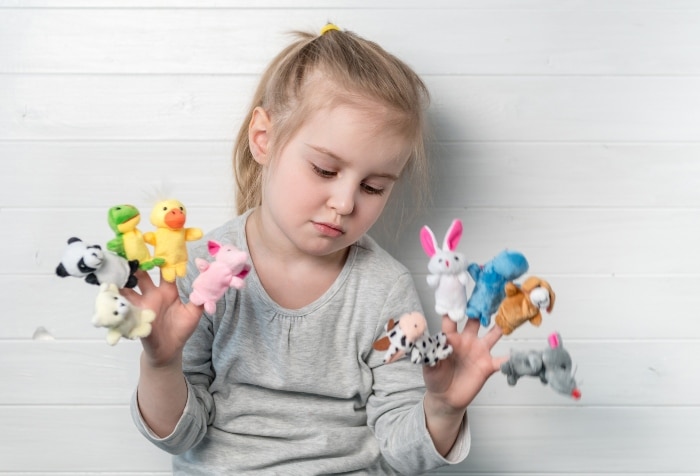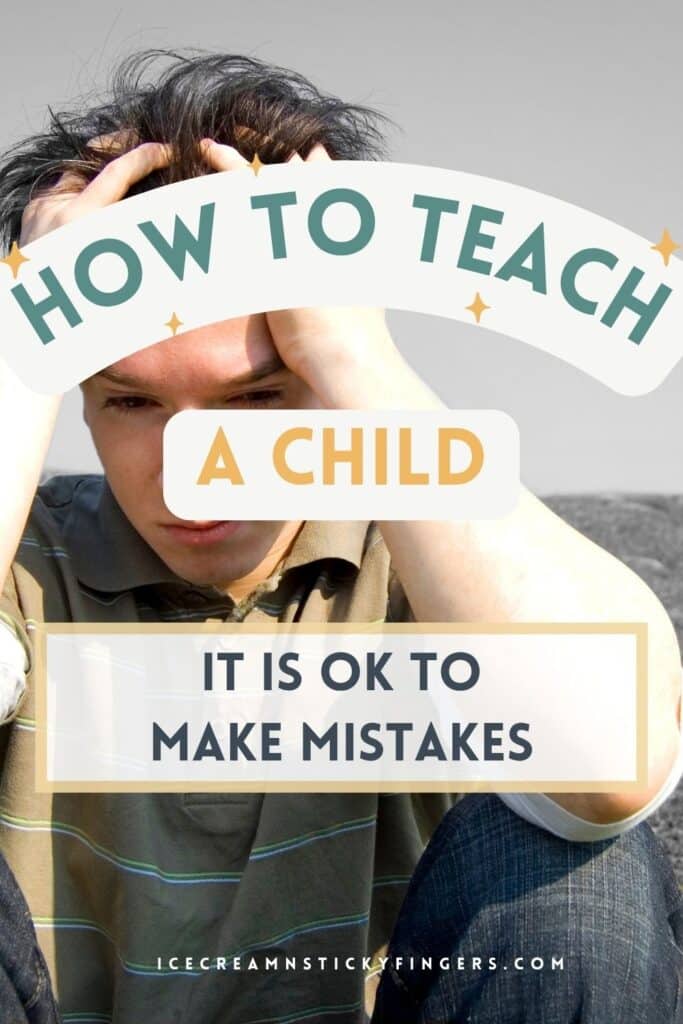Are you looking for how to teach a child it is ok to make mistakes? Making mistakes is a natural and important part of learning. It is better to let kids make mistakes at a young age so that they can easily learn from them. As children grow, they may feel frustrated or discouraged when things don’t go as planned. However, mistakes are not failures—they are opportunities to grow, problem-solve, and improve. Let’s look at some ways that you can teach a child it is ok to make mistakes.

Model Mistake-Making
Did you know that making mistakes is one of the best ways to learn? That’s right! Every time you mess up, you’re getting smarter and stronger. Kids learn by watching you and others as they navigate the world around them. The best thing that you can do is share the mistakes that you made recently with your child. Be open and honest with them. Also, demonstrate how you handled the mistake and what you learned from it. This is a great way to teach a child it is ok to make mistakes.
Create a Safe Environment
When kids feel safe to make mistakes without fear of punishment or embarrassment, they develop resilience, confidence, and problem-solving skills. By fostering a supportive environment where mistakes are seen as opportunities rather than failures, we can encourage children to explore, take risks, and learn valuable life lessons.
This approach not only strengthens their ability to handle challenges but also nurtures a positive attitude toward learning and self-improvement. Don’t be afraid to encourage your child’s effort and process of learning from their mistakes, rather than focusing solely on the outcome. Do avoid negative reactions when your child makes a mistake. You want to remain calm and supportive.
Teach Problem-Solving Skills
Let’s teach our kids how to turn mistakes into learning experiences by fostering a problem-solving mindset. You must also discuss techniques such as self-reflection, analyzing root causes, brainstorming solutions, and applying lessons learned to future situations. This will help your child to be able to process where they made a mistake at and come up with a solution on how to respond differently next time the situation arises. By embracing mistakes as stepping stones rather than setbacks, we cultivate confidence, adaptability, and a proactive approach to challenges.
So next time your child makes a mistake, pull them aside and help guide them through the process of finding the correct solution to the problem. The goal is to help them recognize potential patterns and encourage critical thinking. You can ask your child to think about what went wrong and get them to tell you how they would fix the problem.
Emphasize Growth Mindset
It’s important to use positive language that fosters perseverance and optimism. Encourage individuals to reframe their thinking by saying, “I can’t do it yet,” rather than the more limiting, “I can’t do it.” This small shift in language highlights the potential for growth and improvement over time. Additionally, celebrating small wins is essential—acknowledging even minor progress helps build confidence and reinforces the idea that effort leads to achievement.

Normalize Mistakes
Let’s start normalizing mistakes and helping children see them as a natural part of learning and growth. One effective way to do this is by sharing stories—read books or tell tales about real or fictional people who made mistakes and learned important lessons from them. These stories can help children understand that everyone makes errors and that mistakes are opportunities to grow. Additionally, regularly point out examples in everyday life or from history where mistakes led to success. Whether it’s a scientist who discovered something by accident or an athlete who failed before succeeding, these examples reinforce the idea that mistakes are valuable stepping stones to achievement.
Encourage Risk-Taking
Is your child interested in trying something new? Why not encourage risk-taking by supporting your child as they try new activities and explore unfamiliar experiences? Let them know it’s perfectly okay if they don’t succeed right away—what matters most is the effort. Reassure them that making mistakes is part of learning. Celebrate their willingness to step out of their comfort zone, and praise their courage and determination, regardless of the outcome. This helps build confidence and resilience, making them more likely to embrace challenges in the future.
Provide Constructive Feedback
Providing constructive feedback is necessary because it helps guide improvement effectively. Being specific is important; clearly identifying what went wrong and offering suggestions on how to improve ensures that the feedback is actionable. Additionally, maintaining a positive tone by focusing on the effort and potential for growth encourages motivation and receptiveness to the feedback. Giving constructive feed is a great way to teach a child it is ok to make mistakes and try their best to learn from it.
Teach Self-Compassion
Teaching self-compassion is important because it encourages children to treat themselves with kindness, just as they would a friend who has made a mistake. By fostering this attitude, children learn to be gentle with themselves rather than harshly critical. Additionally, helping children practice self-affirmations allows them to develop positive self-talk, which can counteract negative feelings that arise from mistakes and challenges. This combination supports emotional resilience and a healthier relationship with oneself.
Use Mistakes as Learning Opportunities
Using mistakes as learning opportunities is important because it encourages reflection and growth. By discussing what can be learned from a mistake and how to apply those lessons in the future, children develop a deeper understanding of their experiences. Additionally, helping them set realistic goals based on these reflections supports their progress and reinforces the idea that mistakes are valuable steps in the learning process.
Be Patient
It is important to be patient while kids are learning from their mistakes because understanding and managing errors is a gradual process that takes time. Giving children the space to learn at their own pace helps them build confidence and resilience. Throughout this process, it is crucial to reinforce the idea positively, reminding them that mistakes are a natural and valuable part of learning and growing. This supportive approach encourages persistence and a healthy attitude toward challenges.
Make Mistakes Fun
Making mistakes fun is a great way to help children embrace learning with a positive attitude. One way to do this is by playing “Oops” games, where making mistakes is actually part of the enjoyment—such as silly drawing challenges where unexpected or “wrong” lines become creative additions to the artwork. Another approach is to turn mistakes into art by encouraging children to transform spills or scribbles into something new and imaginative. This playful perspective helps kids see mistakes not as failures but as opportunities for creativity and fun.

Use Humor
Using humor is a powerful way to help children feel more comfortable with making mistakes. Laughing together shows them that mistakes aren’t a big deal and can even be funny. This lighthearted approach helps ease embarrassment or frustration and encourages a more relaxed attitude toward learning. You can also create silly “mistakes” on purpose—like putting shoes on your hands and pretending you’re confused—so your child sees that it’s okay to mess up and laugh about it. This playful mindset builds emotional resilience and makes learning more enjoyable.
Highlight Famous Failures
Highlighting famous failures is a great way to teach children that mistakes are a natural part of success. Sharing stories of well-known individuals like Thomas Edison, J.K. Rowling, or Michael Jordan—who all faced multiple failures before achieving greatness—helps children understand that perseverance is key. Watching videos or reading books about these figures reinforces the message that growth often comes through setbacks. These examples inspire kids to keep trying, even when things don’t go as planned, and to see mistakes as valuable learning opportunities. Even famous people made mistakes, so it is important for you to teach a child it is ok to make mistakes.
Encourage Journaling
Encouraging journaling is a valuable way to help children reflect on their mistakes and grow from them. A mistake reflection journal allows them to write or draw about a mistake they made and what they learned from the experience, helping them process their emotions and recognize the lesson in the situation. Additionally, using “What I Learned Today” pages encourages them to note one thing they learned from a challenge each day, promoting a habit of self-awareness and continuous growth. This practice fosters resilience, emotional intelligence, and a positive mindset toward learning from setbacks.
Praise Their Resilience
Praise their resilience by acknowledging their ability to bounce back. Rather than only celebrating success, focus on recognizing their effort to try again after making a mistake. Use specific praise to highlight their determination—for example, say, “I love how you didn’t give up after that tricky math problem!” This reinforces a growth mindset and encourages persistence.
Let Them See That Even Adults Make Mistakes
It is beneficial to let kids see that even adults make mistakes by pointing out everyday slip-ups. For example, if you burn toast or drop something, say, “Oops! That happens. Let’s fix it.” This normalizes mistakes and teaches problem-solving. Additionally, apologize when you make a mistake yourself—it shows them that everyone, including parents and teachers, messes up sometimes, and that taking responsibility is part of learning and growing.
Reduce Pressure
Reduce pressure by helping children avoid perfectionism and reassuring them that it’s okay not to be perfect at everything. Encourage them to embrace challenges without fear of failure. Allow them to struggle a little by giving them the space to work through problems on their own, rather than stepping in immediately. This fosters independence, resilience, and confidence in their ability to overcome difficulties.

Practice Role-Playing Scenarios
Try practicing different role-playing scenarios to help children develop mistake-recovery skills by acting out situations where they mess up and guiding them on how to respond positively. Encourage problem-solving thinking by asking questions like, “What could we do differently next time?” This approach builds their confidence in handling setbacks and fosters a proactive mindset toward learning from mistakes.
Reward Trying, Not Just Succeeding
Always reward your child for trying, not just for succeeding. Create a “Bravery Board” by putting up a chart where they can add stickers for trying new things, even if they don’t succeed. Celebrate their effort by giving high-fives or special rewards for their persistence, emphasizing the value of effort and courage rather than just the outcome. This helps motivate them to keep learning and growing without fear of failure.
Teach the “Yet” Mindset
Teach your kids the power of the “yet” mindset by encouraging them to add the word “yet” to negative statements. For example, if they say, “I can’t do this,” remind them to say, “I can’t do this yet.” Use this mindset yourself by modeling it in everyday situations, such as saying, “I don’t know how to fix this… yet!” This simple shift helps children see challenges as temporary and encourages a growth mindset focused on learning and improvement. This gives them the opportunity to try and accomplish the task in the future.
By implementing these strategies, you can help your child develop a healthy attitude towards mistakes, viewing them as opportunities for growth and learning rather than failures. Reinforcing these ideas and suggestions, your child will develop confidence, resilience, and a positive attitude toward learning and making mistakes. Reintegrate that everyone makes mistakes from time to time and teach them how to learn from their mishaps. Remind them as you teach a child it is ok to make mistakes.







